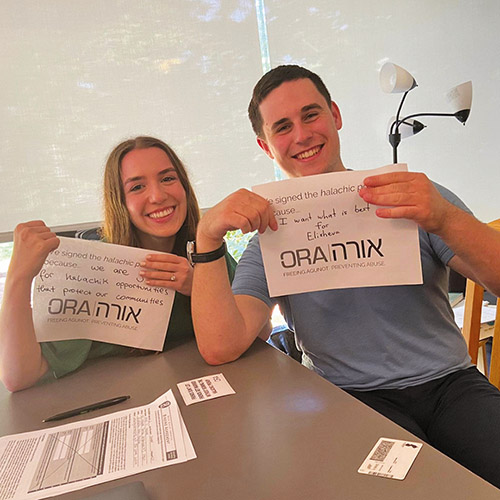


A few months ago, a publisher reached out asking me to review an advanced copy of a marriage book. “I’m happy to,” I answered, “but you should know—I’m really in the opposite business!”
As an advocate for agunot and a writer and speaker on Jewish divorce, I am much more at home in batei din (religious arbitration forums) and courthouses than in wedding halls and rose gardens. In my work at the Organization for the Resolution of Agunot (ORA), we deal with the brutal end of love, not its promising beginning.
But there’s one exception to that rule: the Halachic Prenup. In the midst of the difficult abuse and divorce cases we navigate daily, we are privileged to see engaged couples come in to sign their Prenups, glowingly describing their wedding plans, cozy new apartments, and bright futures. It’s especially exciting to see local couples visit our new office in Teaneck, where we can offer a personal touch to this process. It’s certainly a welcome respite for our staff, but it also begs a larger question: Isn’t signing a Halachic Prenup unromantic?
After all, when we think about marriage, we focus on its strengths—love, loyalty, commitment, the joy of going through life’s ups and downs with a partner and friend. Imagine a proposal scene with rose petals scattered, music playing and heartfelt professions of the life the couple will build. In the heady romance of new love, it’s hard to even imagine “little p” problems: the arguments we will one day have over broken water heaters and vacation expenses. We certainly can’t fathom the large-scale problems couples face, from addiction to abuse to toxic relationships that end in the grief and anger of divorce. When we are first embarking on marriage, tying our home, family and finances to another, the very last thing we want to consider is that it all might fall apart.
Too often, it’s this very discomfort that keeps couples from signing a Halachic Prenup. “But we love each other!” they say indignantly. “And anyway—isn’t it unromantic?” There are a number of responses we could offer to these questions. We can explain to young couples that even when things seem rosy, we never know what tomorrow brings. We can analogize the Prenup to taking out an insurance policy or snapping on a seatbelt, something we do to protect ourselves in the unlikely event that something bad really does happen.
But I want to propose something else: Contrary to public opinion, signing a Prenup is actually the most romantic move of all. You see, I was once a young bride also, ready to get started on my perfect life with my perfect spouse. (Are you laughing yet?) And I have been one of the fortunate ones, experiencing a marriage based on trust and respect, with true friendship and partnership.
And yet, if I had to tell you about the most powerful moments in my marriage, none of them came in the shiny, “perfect” times. Instead, it’s when my husband listens to me struggle with a work issue until late into the night, when we look at each other across a sea of screaming children and break into helpless laughter, when we are lost and the car has run out of gas, that we realize what we have. Like any profound commitment, love and marriage are not forged in the easy times, but when we are forced to rise to our challenges.
At ORA, we work to address a core challenge in Jewish divorce, and our goal is to create a future where get refusal is a relic from the past. One of the key steps towards that end is normalizing the Prenup and encouraging its widespread use. That’s why I’m eager to share one of ORA’s new initiatives, Project Ahava. This time, we’re going a step beyond our high school and college-based programming and presenting the Prenup to the Jewish dating audience, singles, matchmakers, websites and more. When we all sign a Prenup, we can ensure that those who need it most are protected from domestic abuse in the form of get refusal.
At its core, the Prenup says one thing—I love you so much, I want you to be treated with respect, no matter what. Even if the worst happens. Even if it all falls apart. Even if I, your love, am part of the problem. The Prenup is a signal of true commitment, even under fire. And as anyone who has been through the peaks and valleys of a long and deep relationship can tell you, there is nothing more romantic than that.
Keshet Starr, Esq., is the CEO of the Organization for the Resolution of Agunot (ORA), the nonprofit organization seeking to eliminate abuse from the Jewish divorce process. ORA works within the parameters of Jewish law and civil law to advocate for the timely and unconditional issuance of a get. Keshet lives in Hillside with her husband and four children.









